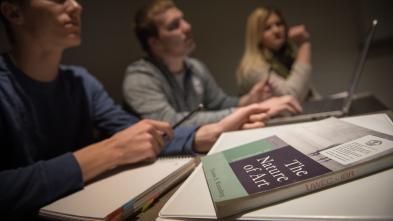
World Religions
Enhance your understanding of the beliefs, practices, and cultural impact of major religious traditions with a world religions certificate from UWEC.
Explore the Meaning of Religion
Designed to help you navigate the complex challenges of life in an increasingly interconnected and globalized world, this certificate is an excellent addition to any major.
Courses throughout the world religions certificate program will dive into topics like the meaning of religion; the nature of religious thought; relations between religious meanings and moral values; and the impact of religious systems, institutions, and issues in local and global contexts. Students will learn the basics of the world's major religions, including tribal traditions, Western religions, Indian religions, and Far Eastern religions.
No matter your professional or career goals, an understanding of the impact of religions on world events is invaluable — and students pursuing any major can benefit greatly from the learning opportunities offered by this certificate program.
Program Details
Blugold Stories
Justthe
facts
The world religions certificate at UW-Eau Claire will broaden your perspective through courses that examine the values of major religions in contrast with the secular world. Studying these diverse viewpoints will help you deconstruct your own conceptions of religious traditions as well as grow more empathetic to the many forms of religious expression within society.
Here are a few courses in World Religions at UW-Eau Claire.
RELS 210
Religion and Morality
Relations between religious meanings and moral values among majority and minority religions of Eastern and Western cultures.
RELS 314
Hinduism
A survey of aspects of Hinduism utilizing secondary and primary sources. The Upanishads, Yoga, Tantrism, village and temple Hinduism. Emphasis on philosophical developments and lifestyles.
RELS 323
Chinese and Japanese Religions
Examines the formative religions of China and Japan, including Chinese and Japanese folk religions, the Religion of the I Ching (Yin/Yang), Confucianism, Taoism, Neo-Confucianism, and Shinto.
Get More Info
Sign up to receive additional information about our campus.











